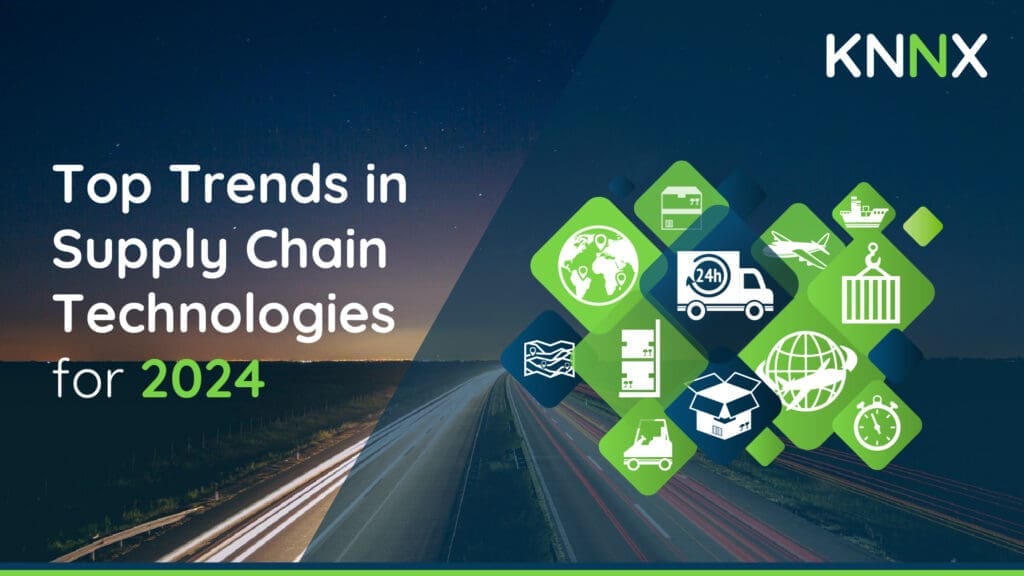Supply Chain Trends in 2024: Navigating the Future of Freight and Logistics

The world of freight and logistics is undergoing profound transformations, driven by a mix of environmental challenges, technological advancements, and the imperative for resilience in the face of global disruptions. As we delve into the trends shaping supply chains in 2024, it’s clear that sustainability, autonomy, resilience, cybersecurity, digitization and data integration are at the forefront of industry innovation.
Sustainability:
With the spectre of climate change looming larger than ever, the freight and logistics sectors are making strides toward greener practices. Regulations like the IMO 2020 rule and initiatives from industry leaders signal a shift towards cleaner fuels and reduced emissions. However, water shortages and port disruptions underscore the urgency for further action in creating sustainable supply chains. Moreover, electric vehicles are gaining significant traction in the logistics industry. Numerous companies are already deploying electric trucks for last-mile delivery, and we anticipate this trend to escalate throughout the year. These sustainability changes are further supported by advancements in carbon measurement systems and tools for analyzing and storing this information, exemplified by technologies like KNNX Freight.
Autonomous Logistics:
The advent of autonomous driving technology promises to revolutionize logistics by increasing efficiency and reducing reliance on human labour. With the potential to mitigate driver shortages and enhance safety, autonomous vehicles are reshaping the future of freight transportation, paving the way for more sustainable and secure logistics operations.
Cybersecurity:
As digitalization accelerates across the industry, cybersecurity emerges as a critical concern. With sensitive data moving into the cloud and the threat landscape evolving, investments in cybersecurity are paramount to safeguarding operations and protecting against cyberattacks and cargo theft. Multifactor authentication and robust security measures are becoming standard practices to ensure the integrity of supply chain networks.
Supply Chain Resilience:
The COVID-19 pandemic exposed vulnerabilities in global supply chains, emphasizing the critical importance of resilience. In response, companies are reassessing their strategies, broadening their supplier base, and harnessing data-driven insights to address risks proactively. Understanding and leveraging data will be pivotal in constructing agile and robust supply chain networks capable of navigating unforeseen challenges.
For instance, during the 2021 Texas snowstorm, which severed connectivity, and the flooding in British Columbia, our KNNX Freight solution demonstrated unwavering reliability. Achieving 100% uptime enabled our clients to maintain seamless operations without interruptions, showcasing our system’s resilience and effectiveness in the face of adversity.
Data Integration & Data-Driven Decision Making:
Big data analytics transforms logistics by providing unprecedented insights into supply chain dynamics. By harnessing advanced analytics and collaborating with partners, businesses can anticipate disruptions and optimize operations to ensure operational resilience. Real-time data and visibility are essential for meeting customer expectations and driving efficiency throughout the supply chain.
Digitization:
Technological innovations like blockchain, AI, and IoT are reshaping logistics by increasing visibility and operational efficiency. By embracing digitalization, logistics becomes a dynamic and responsive system capable of meeting the demands of today’s market. Solutions like KNNX Freight Invoicing Solution streamline invoicing processes, enhance transparency, and drive cost savings, paving the way for a more efficient and agile supply chain ecosystem.
In 2024, the freight and logistics industry is poised for continued transformation, driven by a relentless pursuit of sustainability, innovation, and resilience. As we navigate the challenges and opportunities ahead, embracing these trends will be essential in shaping the future of global supply chains.
If you want to benefit from these trends and further optimize your supply chain process, contact us via info@knnx.com or visit solutions to learn more.